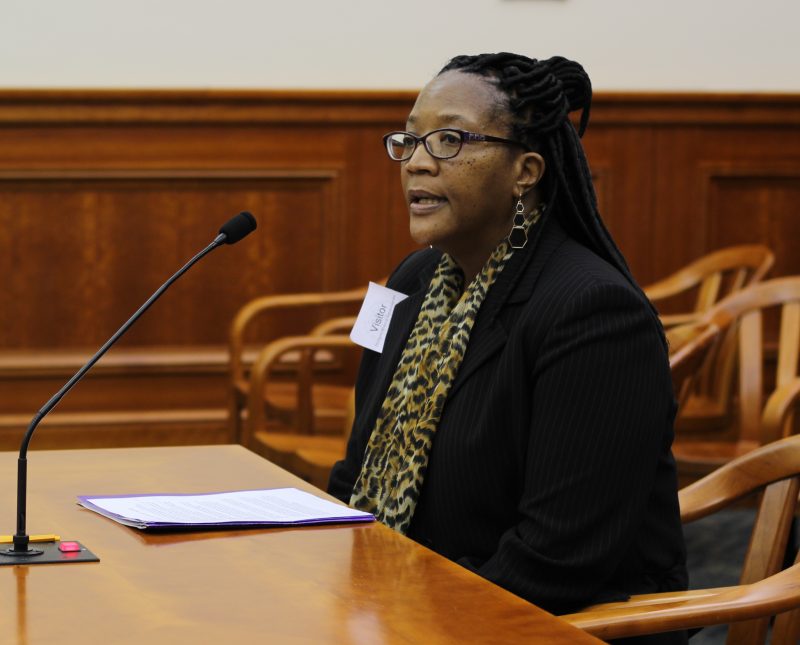Many Michigan crime survivors and their families have limited or no access to crime victim services, trauma care, and other services they need to heal. Underserved crime survivors and their families struggle to rebuild their lives, especially in communities hardest hit by crime and violence.
Research reveals that most crime survivors strongly prefer public investments in crime prevention, trauma treatment and rehabilitation, rather than increased spending on prisons and jails. Early childhood interventions and trauma-informed services can interrupt cycles of violence in communities.

Shari Ware, executive director of Still Standing Against Domestic Violence and a crime survivor, testifies before the House Law and Justice Committee on February 6, 2018.
New safety solutions
Safe & Just Michigan strongly supports public safety solutions that serve the needs of crime survivors. We have worked with our national partners, Crime Survivors for Safety and Justice and the Alliance for Safety and Justice to expand community-based organizations’ access to Victims of Crime Act resources and Trauma Recovery Centers for survivors and their families. There is currently one pilot Trauma Recovery Center operated by Hurley Hospital.
Safe & Just Michigan supports Crisis Intervention Training for law enforcement officers, expanded funding for mental health and substance abuse treatment services, and initiatives that would increase access to affordable housing for crime survivors and their families. We also support prevention initiatives that interrupt the cycle of violence in families and communities.
If you are a crime survivor, a family member, or are working in an organization that serves crime survivors, we invite you to get in touch with us and explore how we can work together for a safer, more just, Michigan.
Resources
- Read: CAPPS releases statewide poll; strong public support for reform, Safe & Just Michigan (formerly CAPPS)
- Read: Crime survivors want investments in trauma services, Safe & Just Michigan (formerly CAPPS)
- Watch: Violence, accountability, and restoration: A conversation with Danielle Sered, Safe & Just Michigan (formerly CAPPS)
- Download: Crime Survivors Speak: The First-Ever National Survey of Victims’ views on Safety and Justice, Alliance for Safety and Justice
- Download: Accounting for Violence: How to Increase Safety and Break Our Failed Reliance on Mass Incarceration, Common Justice and Vera Institute of Justice
- Download: Moving Beyond Sides: The Power and Potential of a New Public Safety Policy Paradigm, Partnership for Safety and Justice
- Download: Untold Stories of California Crime Victims, Chief Justice Earl Warren Institute of Law and Social Policy at UC Berkeley School of Law
- Read: Black wounds matter, The New Yorker
- Read: Focus on rehabilitation in prison, The Detroit News, op-ed by Aswad Thomas, Chapter Development and Membership Director, Crime Survivors for Safety and Justice
- Read: $365K grant will make Hurley trauma center first of its kind in Michigan, MLive
What do the surveys indicate?
Instead of more spending on incarceration, our partner, the Alliance for Safety and Justice, found crime survivors want a wide range of investments in new safety priorities:
- 3 to 1 victims prefer holding people accountable through options beyond prison such as rehabilitation, mental health treatment, drug treatment, community supervision, or community service
- 15 to 1 victims prefer increased investments in schools and education to more investments in prisons and jails
- 10 to 1 victims prefer increased investments in job creation to more investments in prisons and jails
- 7 to 1 victims prefer increased investments in mental health treatment to more investments in prisons and jails
- 7 to 1 victims prefer increased investments in crime prevention and programs for at-risk youth to more investments in prisons and jails
- 4 to 1 victims prefer increased investments in drug treatment to more investments in prisons and jails
- 2 to 1 victims prefer increased investments in community supervision such as probation and parole to more investments in prisons and jails
Read: Crime Survivors Speak: The First-Ever National Survey of Victims’ views on Safety and Justice, Alliance for Safety and Justice
Information on the Victims of Crime Act (VOCA)
The federal Victims of Crime Act (VOCA) of 1984 established federal funding to states to fund services for crime survivors. Every year millions of dollars are deposited into the funds from criminal fines and penalties.
Each state applies for federal funding annually. The states then re-grant the VOCA funds to eligible public and nonprofit organization.
Deadlines, processes, and rules for applicants differ by each state. In Michigan, the Michigan Department of Health and Human Services Crime Victim Services Commission administers the funding. Learn more here.
We want to ensure all crime survivors, especially those of underserved communities, receive access to these services. If you are service provider, you can learn more about applying for these funds through the below two toolkits.
Download: Victims of Crime Act and the Need for Advocacy, Californians for Safety and Justice
Download: Apply for VOCA Funding, Equal Justice USA
